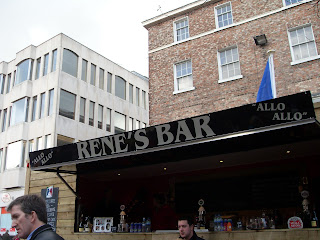Praise ye the LORD. Praise God in his sanctuary: praise him in the firmament of his power.
Praise him for his mighty acts: praise him according to his excellent greatness.
Praise him with the sound of the trumpet: praise him with the psaltery and harp.
Praise him with the timbrel and dance: praise him with stringed instruments and organs.
Praise him upon the loud cymbals: praise him upon the high sounding cymbals.
Let every thing that hath breath praise the LORD. Praise ye the LORD.
- Psalm 150
Now I in you without a bodie move,
Rising and falling with your wings :
We both together sweetly live and love,
Yet say sometimes, God help poore Kings.
- Church-Musick, George Herbert
Church bell clinging on trying to get a crowd for Evensong
- Lions, Dire Straits
For a few weeks now I have made it my Sunday ritual to attend the Choral Evensong service in York Minster at 16.00 The service takes place in the quire of the cathedral, where the central aisle is surrounded by wooden benches for the choir and the attendants, situated beneath the wonderfully crafted vaults that echo the sounds of music and contemplation, making the listener more intent to listen and absorb what he hears.
The East Window, erected in the period 1405-08. During the renovation one can only see a paper replica of the stained glass. The poor quality of the photograph is due to an unfortunate combination of no flash and bad craftsmanship.
The service starts with the chant of the choir heard from the quire nave and followed by their entrace into the quire in two files. When they have taken their places in the benches they sing the responses. Today the responses were taken from William Byrd and Psalm 148 and I was very pleased about this since I William Byrd is one of my favourite musicians. It was very beautiful as is fitting such a majestic setting.
The quire seen from the East Altar. This is where the choir enters and exits.
After the responsories comes the first of two readings for the evening, and it is a wonderful pleasure to hear the words of Scripture spoken in serene English softly reverberated by the stone of the church. Although I consider myself quite familiar with the Holy Bible there are, admittedly, few books I have read in their entirety and Evensong is therefore a great opportunity to be exposed to Biblical passages I do not know or know not well enough. Today's reading from chapter 8 of the Proverbs is an excellent example and the rendition of Wisdom as God's assistant during Creation brings to mind Boethius' Lady Philosophy.
I have noticed that the Anglican Church is quite fond of Paul and his letters are frequently subject to the readings. Personally I have a rather ambivalent relationship with Paul, but his most beautiful passages are superb poetry. A couple of weeks ago the preacher used Paul's writings to illustrate the necessity of context and pointed out that he did not write against slavery just as he never said anything regarding global warming or the war in Iraq. This sober and historically-minded approach is one of the main attractions of the Anglican Church and frequently the sermons appear more like lectures than admonitions, a quality I greatly favour.
And immediately I was in the spirit: and, behold, a throne was set in heaven, and one sat on the throne. And he that sat was to look upon like a jasper and a sardine stone: and there was a rainbow round about the throne, in sight like unto an emerald.
- Revelation 4:2-3
The preacher pointed out, although I haven't seen for myself yet, that chapter 4 of Revelation echoes in the stained glass of the Eastern Window.
After the first reading the choir sings a canticle, today from Leighton's Collegium Magdalenæ, while the congregation stands. The standing of the congregation is a frequent aspect of the service and it enhances the solemnity of the occasion. Whereas in Norway the congregation is expected to stand during the readings and sit during the song, in the Anglican Church it is the other way around. Personally I prefer the Anglican way, because in then the listener can better contemplate the words of the readings and let his mind soar with the music and thus the experience is greatly enhanced.
The vaulted ceiling of the quire.
When the choir has finished the second reading commences. The readings often serve as a prelude comprising two separate elements, one from each of the Testaments, which the preacher weaves together in the sermon. Today's second reading was the fourth chapter of Revelation, a beautiful passage describing the throne of God and a passage that has had a major impact on Medieval art due to its detailed and succinct description of Heaven.
Following the second reading the choir sings another canticle and then the congregation utters the Apostolic Creed. It has often been pointed out that the Church of England is a compromise between Protestantism and Catholicism and this becomes quite obvious in the third section which is rendered in the following manner:
I believe in the Holy Spirit,
the holy catholic Church,
the communion of saints,
the forgiveness of sins,
the resurrection of the body,
and the life everlasting.
Amen
After the Apostolic Creed the choir sings a selection of prayers and responses, ending with the Lord's Prayer. Following this session one of the priests prays the intercession and the choir then sings an anthem which basically serves as an introitus to the sermon.
The sermons are one of the many reasons why I keep returning to the Minster for Evensong. The priests are men of erudition expressing a devout and mild-mannered concern for humanity. So far I have not encountered any brimstone in the words of the preachers, quite the contrary. In the various sermons I have heard, the emphasis is on the joys of life, the forgiveness and the love of God and - as was the case today - the aspect of praise.
The first time I attended Evensong I came too late and had to stand outside the quire, which did by no means impair the aural experience. The preacher had a wonderfully mellow voice and he talked about the God of overflow and the importance of praise, not only to God but also to our fellow men and women. Today the Reverend Canon Jonathan Draper talked about praise in relation to the imagery of Proverbs and Revelation, claiming quite beautifully that for a Christian "praise is the default position, if I can put it that way." He also pointed out how praise had been central to the Christian religion for centuries, giving examples from Job, Paul and George Herbert (1593-1633), the latter claiming in a manner typical of his age that praise is the philosopher's stone.
I find it immensely attractive that the major focus of the preachers at York Minster is the benevolence of God and that particularly Christian care for one's neighbours that never deviates into prying but allows for privacy in matters that should remain private, delightfully formulated in liberal sobriety.
When the sermon is over the congregation sings the hymn for the day while standing, followed by the exit of the choir. The singers return to the quire nave from whence they entered and sings a responsory which is followed by the voluntary, which is a musical piece performed by the organist while the quire is evacuated.
The central nave and the Great West Window with the Heart of Yorkshire.
Evensong lasts for about 45 minutes and its brevity is one of its very appealing aspects, since it allows a speedy progression that avoids the risk of tiring the listener. The combination of professional singers and liberal-minded theologians succeeding each other in a nice arrangement also heightens the experience.






































































